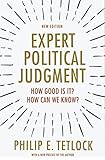Expert Political Judgment : How Good Is It? How Can We Know? - New Edition / Philip E. Tetlock.
Material type: TextPublisher: Princeton, NJ : Princeton University Press, [2017]Copyright date: ©2017Edition: NewDescription: 1 online resource (368 p.)Content type:
TextPublisher: Princeton, NJ : Princeton University Press, [2017]Copyright date: ©2017Edition: NewDescription: 1 online resource (368 p.)Content type: - 9780691175973
- 9781400888818
- 320/.01/9
- online - DeGruyter
- Issued also in print.
| Item type | Current library | Call number | URL | Status | Notes | Barcode | |
|---|---|---|---|---|---|---|---|
 eBook
eBook
|
Biblioteca "Angelicum" Pont. Univ. S.Tommaso d'Aquino Nuvola online | online - DeGruyter (Browse shelf(Opens below)) | Online access | Not for loan (Accesso limitato) | Accesso per gli utenti autorizzati / Access for authorized users | (dgr)9781400888818 |
Browsing Biblioteca "Angelicum" Pont. Univ. S.Tommaso d'Aquino shelves, Shelving location: Nuvola online Close shelf browser (Hides shelf browser)

|

|

|

|

|

|

|
||
| online - DeGruyter The Unstill Ones : Poems / | online - DeGruyter Kierkegaard's Muse : The Mystery of Regine Olsen / | online - DeGruyter Protestants Abroad : How Missionaries Tried to Change the World but Changed America / | online - DeGruyter Expert Political Judgment : How Good Is It? How Can We Know? - New Edition / | online - DeGruyter The Burr Conspiracy : Uncovering the Story of an Early American Crisis / | online - DeGruyter Designing San Francisco : Art, Land, and Urban Renewal in the City by the Bay / | online - DeGruyter The Mexican Heartland : How Communities Shaped Capitalism, a Nation, and World History, 1500-2000 / |
Frontmatter -- Contents -- Acknowledgments -- Preface -- Preface to the 2017 Edition -- CHAPTER 1. Quantifying the Unquantifiable -- CHAPTER 2. The Ego-deflating Challenge of Radical Skepticism -- CHAPTER 3. Knowing the Limits of One's Knowledge -- CHAPTER 4. Honoring Reputational Bets -- CHAPTER 5. Contemplating Counterfactuals -- CHAPTER 6. The Hedgehogs Strike Back -- CHAPTER 7. Are We Open-minded Enough to Acknowledge the Limits of Open-mindedness? -- CHAPTER 8. Exploring the Limits on Objectivity and Accountability -- Methodological Appendix -- Technical Appendix -- Index
restricted access online access with authorization star
http://purl.org/coar/access_right/c_16ec
Since its original publication, Expert Political Judgment by New York Times bestselling author Philip Tetlock has established itself as a contemporary classic in the literature on evaluating expert opinion.Tetlock first discusses arguments about whether the world is too complex for people to find the tools to understand political phenomena, let alone predict the future. He evaluates predictions from experts in different fields, comparing them to predictions by well-informed laity or those based on simple extrapolation from current trends. He goes on to analyze which styles of thinking are more successful in forecasting. Classifying thinking styles using Isaiah Berlin's prototypes of the fox and the hedgehog, Tetlock contends that the fox--the thinker who knows many little things, draws from an eclectic array of traditions, and is better able to improvise in response to changing events--is more successful in predicting the future than the hedgehog, who knows one big thing, toils devotedly within one tradition, and imposes formulaic solutions on ill-defined problems. He notes a perversely inverse relationship between the best scientific indicators of good judgement and the qualities that the media most prizes in pundits--the single-minded determination required to prevail in ideological combat. Clearly written and impeccably researched, the book fills a huge void in the literature on evaluating expert opinion. It will appeal across many academic disciplines as well as to corporations seeking to develop standards for judging expert decision-making. Now with a new preface in which Tetlock discusses the latest research in the field, the book explores what constitutes good judgment in predicting future events and looks at why experts are often wrong in their forecasts.
Issued also in print.
Mode of access: Internet via World Wide Web.
In English.
Description based on online resource; title from PDF title page (publisher's Web site, viewed 30. Aug 2021)


